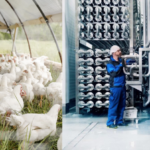One of the fundamental problems in society today is the lack of trust. Surveys, as for example the Edelman Trust Barometer, indicate we are rapidly losing trust in all of the traditional institutions. Especially businesses and governments are affected.
The cost of low trust is high. You will need written agreements, a lot of bureaucracy, a lot of extra costs. At the same time as trust in institutions is fading, a shift is underway from the 20th century defined by institutional trust’ towards the 21st century that will be defined by ‘distributed trust. This shift is made possible by new technology platforms which are significantly reducing the cost of building and running business at scale. The collaborative economy, for example, has turned trust into a commercial currency and triggered a new way of doing business driven by the reputation not only of brands, but also consumers.
Trust Technologies and Investing for Good
Technology is creating new mechanisms that are enabling us to trust unknown people, companies and ideas and as the number of digital technologies has grown, so too has the number of tools that can be used for building trust in collaborative environments. Encouragingly, this growth has carried over to organizations with environmental and social goals as well. A recent study by the innovation charity Nesta has identified nearly 1,000 organizations (and nearly 700 collaborative projects) working in the field of “digital social innovation” across Europe. Here you will find compelling examples of how global problems such as climate change, conflict, social integration, economic inequality, health problems or disease epidemics are solved by new businesses, partnerships and innovative ideas. We also see that a new generation of investors, “the impact investors”, are entering the stage. They are investing in the global solutions. This new wave of investing is being shaped by new attitudes and values. They are, in other words, not only looking to make a profit, but looking for projects with a bigger purpose which is often related to making a larger impact – outside the borders of the organization.
As InnoMag´s new topic editor, I will over the upcoming months be reporting on this new shift of people and organizations who are building the new economy. Who are the actors? What do they do? And why are they doing what they do? And not the least – how can we learn from them so we can create new opportunity spaces for investment and doing business for good.









